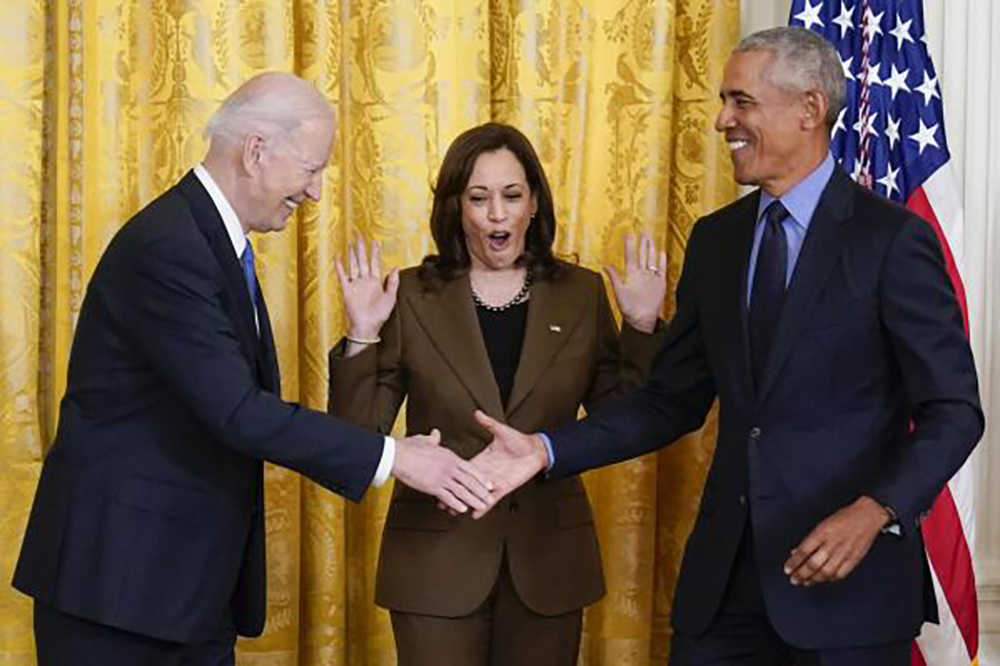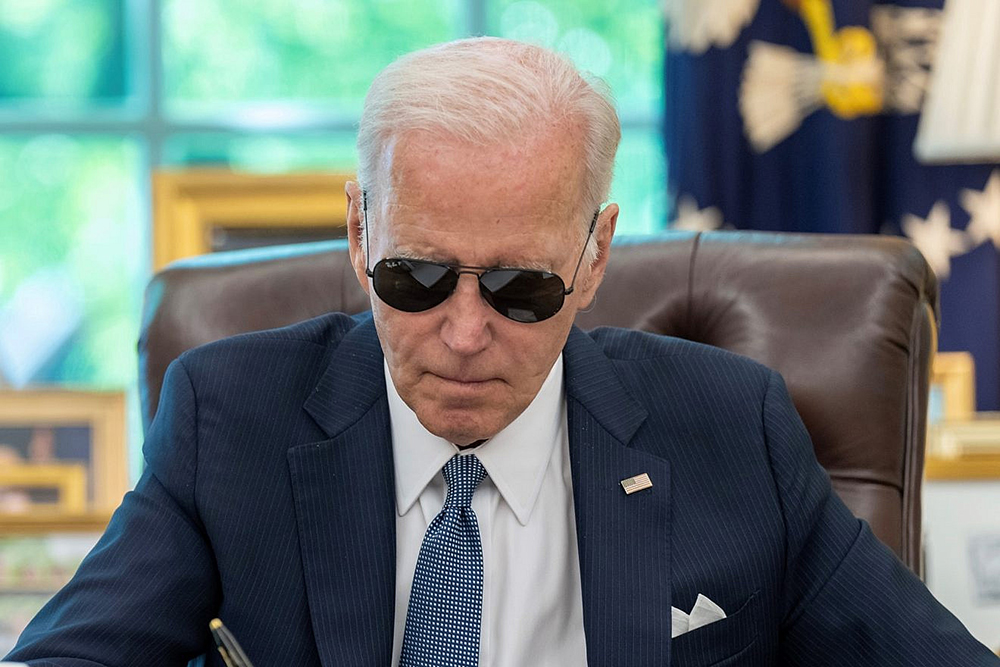|
Getting your Trinity Audio player ready...
|
The presidential debate raised questions about Joe Biden’s competence. Still, the perception of America’s weakness is about more than cognitive decline.
By: Jonathan S. Tobin
For some observers worried about the widespread perception of American weakness abroad, President Joe Biden’s shocking performance in last week’s debate with former President Donald Trump provided an easy explanation for the country’s problems. The disasters on his watch—from the disgraceful rout of the Afghanistan withdrawal to the war in Ukraine and the Oct. 7 attacks on Israel facilitated by American appeasement of Iran—have left American foreign policy in ruins and a world in chaos. Thus, the evidence of Biden’s diminished capacity on display during the 90-minute verbal wrangle can be seen as a reason why the nation’s enemies have been emboldened during the last three-and-a-half years.
But even if Biden is a liability, to the United States as well as the Democratic Party, the problem goes deeper than the president’s apparent decline.
No matter how sharp the current commander-in-chief may be, the crises abroad are as much a function of flawed policies that the Biden foreign-policy team has been pursuing as the president’s lack of acuity. A weak leader is a standing invitation for provocations they believe will not generate a robust response. But if the aim of American policy is diplomacy for its own sake and a desire to appease the most dangerous foes, then even a great leader might not avert disaster.

A 10 a.m. to 4 p.m. president?
As for Biden’s problems, an explanation for what might be described as the most disastrous public appearance for a president, let alone at a presidential debate, the attempts to spin the fiasco from inside the White House raised more questions than they answered.
Midway through the debate, the president’s aides let it be known that he had a cold. Yet realizing that they were dealing with a disaster, in the coming days they came up with a different explanation. According to Axios, which, along with The New York Times, is the best place to go to read administration leaks generally intended to flatter President Joe Biden, the problem was the time of day. The online publication reported that White House staffers said that there were basically two Bidens:
“From 10 am to 4 pm, Biden is dependably engaged—and many of his public events in front of cameras are held within those hours. Outside of that time range or while traveling abroad, Biden is more likely to have verbal miscues and become fatigued, aides told Axios.”
That is, one supposes, possibly closer to the truth than the spin the president’s allies were floating in public the weekend following the debate, which more or less amounted to a demand that Americans ignore what they saw and heard on Thursday night. Given the bifurcated and essentially tribal nature of U.S. politics these days, social media and online commenting showed that was good enough for many Democrats, if not too many others.
While perhaps we’d all like to work what used to be called “bankers’ hours,” that’s a problem for someone who is always accompanied by a military aide who carries the so-called “nuclear football” with the launch codes for the nation’s nuclear weapons. A president may be called upon to make decisions of national or international importance at any time of day or night, and not just because, as Ronald Reagan put it, they “live above the store.” In the 2008 Democratic primary campaign, Hillary Clinton famously ran what became known as the “3 a.m. phone call ad,” in which she touted herself as ready and able to answer the phone during a crisis that didn’t come during regular office hours.
If the best the White House can do is to say that Biden is ready to answer the call only six hours a day, that’s not terribly reassuring. As Americans sift through the implications of the post-debate spin and the fact that Biden staffers and their media echo chamber have been lying about the president’s acuity, that is not the nation’s main problem. Nor is the key question to be answered right now whether Biden can be prevailed upon to pull out of the race—a move that the Times reports that his wife Jill, son Hunter and the rest of his family adamantly oppose—to be replaced with the equally unpopular Vice President Kamala Harris or another Democrat. It’s who is in charge of the decision-making process right now, no matter what time of day one is needed, and what is it that they are trying to achieve?

Obama replay
Biden’s foreign policy has from its first day in office been essentially a replay of that pursued during the presidency of Barack Obama. With much of the same personnel in place at the National Security Council and the U.S. State Department, they were primarily focused on turning the clock back to January 2017 and rolling back everything that Trump did in his four years.
To speak of the Obama influence inevitably raises claims that the 44th president is the puppet master and Biden merely a stand-in for him. While Obama has enormous influence on the current administration, it would be misleading to say he is merely pulling the strings on a Biden marionette. While his former staffers still look up to him in a way they have never done with Biden, running a country or even its foreign policy is too complex a matter to be handled by someone who is no longer in the rooms where things happen. Not to mention the fact that Biden’s inner circle still resent Obama’s high-handed treatment of him while he was vice president, as well as the way he pushed him aside to ease the way for Clinton’s failed presidential run in 2016.
Still, it is true that Obama’s ideas and policies are more or less identical to those of the current administration. At the top of its “To Do” list was an attempt to revive Obama’s disastrous Iran nuclear deal by lifting most of the sanctions Trump imposed and unfreezing Iranian assets. But the Iranians were having none of it. Though they benefited enormously from Biden’s decisions, they refused to seriously negotiate even for a weaker nuclear pact than the one Obama trumpeted as his foreign-policy legacy in 2015. They pocketed the money that rolled into their coffers from the switch in policy and invested it in their main goals: spreading terror and getting closer to achieving their nuclear ambitions.
Even worse, the Biden team then proceeded to precipitously pull out of Afghanistan. While Trump had also planned to end the American presence in that country after nearly two decades of the war there, he had held off doing so until the Afghan government could properly prepare. Biden, however, wished to boast that there were no U.S. troops there on the 20th anniversary of the war, and acting with impatience and a lack of foresight, wound up presiding over a complete collapse of the country and an easy triumph for the Taliban. American personnel died in the chaos (giving the lie to Biden’s false debate claim that no American forces died on his watch) with others left behind, as well as billions of dollars in equipment left for the terrorists to seize.
That was the beginning of a spiral of bad foreign news for the United States. With America’s enemies convinced that Biden wasn’t to be feared and utterly feckless, it was only a matter of time before they would strike. Six months later, following a series of rather confusing Biden pronouncements on the issue, Russia invaded Ukraine. In the following two years, the United States has helped prop up the Ukrainians with an unprecedented amount of aid. With the war now stalemated, the administration is stuck with a policy supposedly dedicated to the defeat of Russia but lacks a plan that would explain how that might be achieved, no matter how many hundreds of billions are sent to Kyiv.
In the fall of 2023, the cost of Washington’s commitment to appeasing Iran led to another catastrophe. The Oct. 7 Hamas assault on Israel was facilitated by Iranian aid, as well as the justified perception that the administration was more interested in toppling the government of Prime Minister Benjamin Netanyahu than in bolstering Israel’s security. Biden initially responded to the largest mass slaughter of Jews since World War II and the Holocaust with a pledge of support for Israel and the goal of eliminating Hamas.
However, the Biden team of Obama alumni is, at its core, hostile to Netanyahu and Israeli security, and committed to the goal of Palestinian statehood with an almost religious fervor. So, it was little surprise that almost within days of Biden’s first praiseworthy statements concerning Oct. 7, that the administration began talking out of both sides of its mouth about the war. Since then, it has continued to aid Israel but has slow-walked arms deliveries, recycled Palestinian propaganda, and sought to stall and second-guess Israel’s efforts to defeat Hamas.

A fatal combination
Has a president who is, at best, a part-time leader or at worst, no longer capable of facing the enormous challenges of the presidency, played a role in exacerbating these problems? That seems obvious. As The Wall Street Journal reported, European leaders were shocked by Biden’s diminished capacity at the recent G-7 Summit. Indeed, the president skipped the part of the proceedings where the allied heads of government meet informally for candid discussions where there would be no teleprompter telling him what to say, as is reportedly the case for all Biden appearances these days, including small fundraising gatherings.
The president has seemed to lack the ability to anticipate and forestall crises by either effective policies or making foes fear the consequences of crossing the United States, as was almost certainly the case when Trump was in charge. Yet by seeking to recycle Obama’s policies towards Iran, Russia and Israel that had already been shown to have failed, Biden was on course for trouble even if he had been at his best.
The president’s visible decline is not so much a reason to replace him on the Democratic ticket as it is to question whether he ought to still be running things until January. What has unfolded on his watch has been a string of disasters that are not merely the result of his personal failings but of an administration dedicated to ideas about multilateralism, the importance of failing international organizations like the United Nations and an attempt to befriend nations that see themselves as at war with the West. Though it is apparent to all except those who are blinded by partisanship, the combination of these two factors has been a recipe for a world in crisis.
(JNS.org)
Jonathan S. Tobin is editor-in-chief of JNS (Jewish News Syndicate). Follow him @jonathans_tobin.




